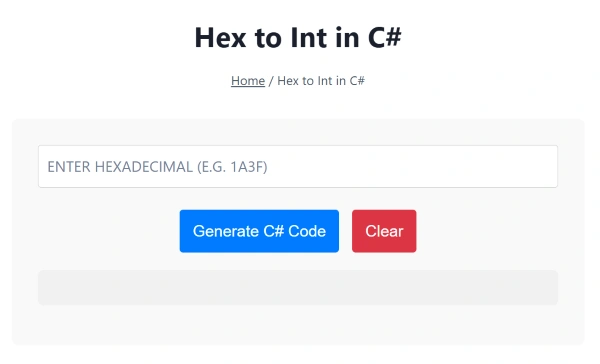Hex to Int in C#
Reverse Conversion Tool: Int to Hex in C#
Convert Hexadecimal to Integer in C# with Multiple Methods
Learn how to convert hexadecimal strings to integers in C# using various built-in methods and best practices. This comprehensive guide covers everything from basic conversions to advanced error handling techniques for robust C# applications.

Understanding Hexadecimal to Integer Conversion in C#
Converting hexadecimal values to integers is a fundamental operation in C# programming, especially when working with low-level operations, memory addresses, color codes, or data parsing. C# provides several reliable methods to perform hex to int conversion, each with specific use cases and advantages.
Method 1: Using Convert.ToInt32() – The Standard Approach
The most straightforward way to convert hex to int in C# is using the Convert.ToInt32() method with base 16:
string hexValue = "FF";
int intValue = Convert.ToInt32(hexValue, 16);
Console.WriteLine(intValue); // Output: 255
// With 0x prefix
string hexWithPrefix = "0x1A3F";
int result = Convert.ToInt32(hexWithPrefix, 16); // Handles 0x automaticallyThis method automatically handles both uppercase and lowercase hex digits and can process hex strings with or without the “0x” prefix. For manual verification of your hex calculations, you can use our hex calculator to double-check your conversion results.
Method 2: Using int.Parse() with Hexadecimal Format
The int.Parse() method combined with NumberStyles.HexNumber provides another robust conversion approach:
using System.Globalization;
string hexString = "BEEF";
int parsedInt = int.Parse(hexString, NumberStyles.HexNumber);
Console.WriteLine(parsedInt); // Output: 48879
// Alternative syntax
int result = int.Parse("A1B2", NumberStyles.AllowHexSpecifier);This method offers more control over the parsing process and provides better error handling capabilities for invalid hex strings.
Method 3: Using TryParse() for Safe Conversion
For production applications where input validation is crucial, TryParse() provides safe hex to int conversion without throwing exceptions:
string userInput = "12AB";
if (int.TryParse(userInput, NumberStyles.HexNumber,
CultureInfo.InvariantCulture, out int result))
{
Console.WriteLine($"Converted: {result}");
}
else
{
Console.WriteLine("Invalid hexadecimal format");
}This approach is essential for handling user input or data from external sources where the hex format might be unreliable.
Working with Different Hex Input Formats
C# hex conversion methods can handle various input formats commonly encountered in real-world applications:
Standard Hex Strings:
// Uppercase
int val1 = Convert.ToInt32("DEADBEEF", 16);
// Lowercase
int val2 = Convert.ToInt32("deadbeef", 16);
// Mixed case
int val3 = Convert.ToInt32("DeAdBeEf", 16);Hex with Prefixes:
// With 0x prefix
string hex1 = "0x1234";
int result1 = Convert.ToInt32(hex1.Replace("0x", ""), 16);
// With # prefix (color codes)
string colorHex = "#FF5733";
int colorInt = Convert.ToInt32(colorHex.Replace("#", ""), 16);When working with color codes, you might also need to convert between different number bases. Our decimal to hexadecimal converter can help you verify color value conversions.
Handling Large Hex Values
For hex values that exceed the int range, use appropriate data types:
// For values larger than int.MaxValue
string largeHex = "FFFFFFFF";
uint unsignedResult = Convert.ToUInt32(largeHex, 16);
// For very large values
string veryLargeHex = "FFFFFFFFFFFFFFFF";
long longResult = Convert.ToInt64(veryLargeHex, 16);Error Handling Best Practices
Implement comprehensive error handling for robust hex to int conversion:
public static int SafeHexToInt(string hexString)
{
try
{
// Remove common prefixes
hexString = hexString.Replace("0x", "").Replace("#", "");
// Validate hex string
if (string.IsNullOrWhiteSpace(hexString))
throw new ArgumentException("Hex string cannot be empty");
if (hexString.Length > 8) // int overflow check
throw new OverflowException("Hex value too large for int");
return Convert.ToInt32(hexString, 16);
}
catch (FormatException)
{
throw new ArgumentException($"Invalid hex format: {hexString}");
}
catch (OverflowException)
{
throw new OverflowException($"Hex value {hexString} exceeds int range");
}
}Performance Considerations
When performing bulk hex to int conversions, consider these performance optimization techniques:
// Pre-compile regex for validation (if needed)
private static readonly Regex HexPattern =
new Regex(@"^[0-9A-Fa-f]+$", RegexOptions.Compiled);
// Batch conversion method
public static List<int> ConvertHexBatch(IEnumerable<string> hexValues)
{
return hexValues
.Where(hex => !string.IsNullOrEmpty(hex))
.Select(hex => Convert.ToInt32(hex.Replace("0x", ""), 16))
.ToList();
}Common Use Cases and Applications
Memory Address Parsing:
string memoryAddress = "0x7FFF5FBF";
int address = Convert.ToInt32(memoryAddress.Replace("0x", ""), 16);Color Code Processing:
public static Color HexToColor(string hexColor)
{
hexColor = hexColor.Replace("#", "");
int rgb = Convert.ToInt32(hexColor, 16);
return Color.FromArgb(
(rgb >> 16) & 0xFF, // Red
(rgb >> 8) & 0xFF, // Green
rgb & 0xFF // Blue
);
}Configuration File Parsing:
// Reading hex values from config
string configHex = ConfigurationManager.AppSettings["MaxRetries"];
int maxRetries = Convert.ToInt32(configHex, 16);Integration with Other Number Systems
Understanding hex to int conversion often requires knowledge of other number systems. For comprehensive number system work, consider these related conversions:
- Binary Operations: After converting hex to int, you might need binary representation. Our binary to hex converter can help with binary-hexadecimal operations.
- Decimal Verification: Use our main hex calculator to perform arithmetic operations on hex values before conversion.
- Reverse Conversion: When you need to convert integers back to hex format, understanding the reverse process is crucial.
Advanced Techniques and Extensions
Custom Hex Converter Class:
public static class HexConverter
{
public static int ToInt32(string hex, bool throwOnError = true)
{
if (throwOnError)
return Convert.ToInt32(CleanHexString(hex), 16);
return int.TryParse(CleanHexString(hex), NumberStyles.HexNumber,
CultureInfo.InvariantCulture, out int result)
? result : 0;
}
private static string CleanHexString(string hex)
{
return hex?.Replace("0x", "").Replace("#", "").Trim() ?? "";
}
}Hex String Validation:
public static bool IsValidHex(string input)
{
if (string.IsNullOrWhiteSpace(input))
return false;
string cleanHex = input.Replace("0x", "").Replace("#", "");
return cleanHex.All(c => "0123456789ABCDEFabcdef".Contains(c));
}Testing Hex to Int Conversion
Comprehensive unit testing ensures reliable hex conversion:
[TestMethod]
public void TestHexToIntConversion()
{
// Test basic conversion
Assert.AreEqual(255, Convert.ToInt32("FF", 16));
// Test with prefix
Assert.AreEqual(255, Convert.ToInt32("0xFF".Replace("0x", ""), 16));
// Test case insensitive
Assert.AreEqual(255, Convert.ToInt32("ff", 16));
// Test edge cases
Assert.AreEqual(0, Convert.ToInt32("0", 16));
Assert.AreEqual(int.MaxValue, Convert.ToInt32("7FFFFFFF", 16));
}Troubleshooting Common Issues
Format Exceptions: Always validate input before conversion and handle potential format exceptions gracefully.
Overflow Errors: Check hex string length and value range before converting to prevent overflow exceptions.
Null/Empty Strings: Implement null checks and empty string validation in your conversion methods.
Invalid Characters: Ensure hex strings contain only valid hexadecimal characters (0-9, A-F, a-f).
Performance Benchmarks
For applications requiring high-performance hex conversion, benchmark different methods:
// Fastest for simple cases
int Method1() => Convert.ToInt32(hexString, 16);
// Best for error handling
bool Method2() => int.TryParse(hexString, NumberStyles.HexNumber,
CultureInfo.InvariantCulture, out int result);